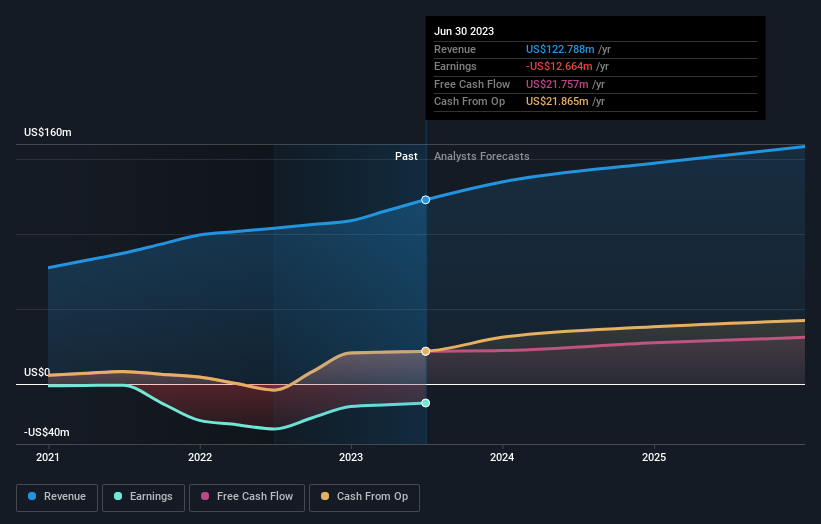Public Policy Holding Company, Inc. (LON:PPHC) insiders seem bullish, own 47% and have been buying more recently
Key Insights
Public Policy Holding Company's significant insider ownership suggests inherent interests in company's expansion
A total of 8 investors have a majority stake in the company with 52% ownership
Insiders have bought recently
A look at the shareholders of Public Policy Holding Company, Inc. (LON:PPHC) can tell us which group is most powerful. With 47% stake, individual insiders possess the maximum shares in the company. Put another way, the group faces the maximum upside potential (or downside risk).
A quick look at our data suggests that insiders have been buying shares in the company recently. This could signal that stock prices could go up and insiders are here for it.
In the chart below, we zoom in on the different ownership groups of Public Policy Holding Company.
View our latest analysis for Public Policy Holding Company

What Does The Institutional Ownership Tell Us About Public Policy Holding Company?
Institutions typically measure themselves against a benchmark when reporting to their own investors, so they often become more enthusiastic about a stock once it's included in a major index. We would expect most companies to have some institutions on the register, especially if they are growing.
We can see that Public Policy Holding Company does have institutional investors; and they hold a good portion of the company's stock. This suggests some credibility amongst professional investors. But we can't rely on that fact alone since institutions make bad investments sometimes, just like everyone does. When multiple institutions own a stock, there's always a risk that they are in a 'crowded trade'. When such a trade goes wrong, multiple parties may compete to sell stock fast. This risk is higher in a company without a history of growth. You can see Public Policy Holding Company's historic earnings and revenue below, but keep in mind there's always more to the story.

Public Policy Holding Company is not owned by hedge funds. The company's largest shareholder is The Alpine Group, Inc., with ownership of 11%. Jeffrey Forbes is the second largest shareholder owning 10.0% of common stock, and Daniel Tate holds about 6.8% of the company stock. In addition, we found that George Hall, the CEO has 5.5% of the shares allocated to their name.
On further inspection, we found that more than half the company's shares are owned by the top 8 shareholders, suggesting that the interests of the larger shareholders are balanced out to an extent by the smaller ones.
While it makes sense to study institutional ownership data for a company, it also makes sense to study analyst sentiments to know which way the wind is blowing. There is a little analyst coverage of the stock, but not much. So there is room for it to gain more coverage.
Insider Ownership Of Public Policy Holding Company
While the precise definition of an insider can be subjective, almost everyone considers board members to be insiders. Management ultimately answers to the board. However, it is not uncommon for managers to be executive board members, especially if they are a founder or the CEO.
Most consider insider ownership a positive because it can indicate the board is well aligned with other shareholders. However, on some occasions too much power is concentrated within this group.
Our most recent data indicates that insiders own a reasonable proportion of Public Policy Holding Company, Inc.. Insiders own UK£62m worth of shares in the UK£131m company. We would say this shows alignment with shareholders, but it is worth noting that the company is still quite small; some insiders may have founded the business. You can click here to see if those insiders have been buying or selling.
General Public Ownership
With a 33% ownership, the general public, mostly comprising of individual investors, have some degree of sway over Public Policy Holding Company. While this group can't necessarily call the shots, it can certainly have a real influence on how the company is run.
Private Company Ownership
Our data indicates that Private Companies hold 11%, of the company's shares. It's hard to draw any conclusions from this fact alone, so its worth looking into who owns those private companies. Sometimes insiders or other related parties have an interest in shares in a public company through a separate private company.
Next Steps:
While it is well worth considering the different groups that own a company, there are other factors that are even more important. Take risks for example - Public Policy Holding Company has 3 warning signs (and 1 which can't be ignored) we think you should know about.
If you would prefer discover what analysts are predicting in terms of future growth, do not miss this free report on analyst forecasts.
NB: Figures in this article are calculated using data from the last twelve months, which refer to the 12-month period ending on the last date of the month the financial statement is dated. This may not be consistent with full year annual report figures.
Have feedback on this article? Concerned about the content? Get in touch with us directly. Alternatively, email editorial-team (at) simplywallst.com.
This article by Simply Wall St is general in nature. We provide commentary based on historical data and analyst forecasts only using an unbiased methodology and our articles are not intended to be financial advice. It does not constitute a recommendation to buy or sell any stock, and does not take account of your objectives, or your financial situation. We aim to bring you long-term focused analysis driven by fundamental data. Note that our analysis may not factor in the latest price-sensitive company announcements or qualitative material. Simply Wall St has no position in any stocks mentioned.

 Yahoo Finance
Yahoo Finance 